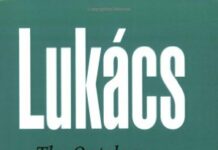
Ebook Info
- Published: 2009
- Number of pages: 107 pages
- Format: PDF
- File Size: 1.19 MB
- Authors: Georg Lukacs
Description
Out of the chaos following Lenin’s death and the mounting fury against Lukács and his freshly penned History and Class Consciousness (1923), this book bears an assessment of Lenin as “the only theoretical equal to Marx.” Lukács shows, with unprecedented clarity, how Lenin’s historical interventions—from his vanguard politics and repurposing of the state to his detection of a new, imperialist stage of capitalism—advanced the conjunction of theory and practice, class consciousness and class struggle. A postscript from 1967 reflects on how this picture of Lenin, which both shattered failed Marxism and preserved certain prejudices of its day, became even more inspirational after the oppressions of Stalin. Lukács’s study remains indispensable to an understanding of the contemporary significance of Lenin’s life and work.
User’s Reviews
Editorial Reviews: Review “The definitive study of Lenin’s political theory.”—Observer About the Author Georg Lukács (1885–1971) was a Hungarian Marxist philosopher and literary critic. Most scholars consider him to be the founder of the tradition of Western Marxism. He contributed the ideas of reification and class consciousness to Marxist philosophy and theory, and his literary criticism was influential in thinking about realism and about the novel as a literary genre. He served briefly as Hungary’s Minister of Culture following the 1956 Hungarian Revolution.
Reviews from Amazon users which were colected at the time this book was published on the website:
⭐The first 90 pages of this book are primarily hagiography. Which is a shame because overall Lukacs was undoubtedly one of the greatest thinkers of the 20th century, and certainly one of the greatest, if not the greatest, Marxist thinker of the 20th century. But Lukacs interjects that no, Lenin is in fact the true genius of our time, since Marx. Where as Marx gave us the theoretical cunning to wage class warfare, Lenin consummately put it into practice.Lenin’s true genius, according to Lukacs, was to always be aware of the ‘actuality of revolution’ at all moments. All his books, essays, and actions, need to be considered in their historical moment, while simultaneously considering how Lenin saw the revolution as actually becoming, not just possible, or inevitable.The Postscript to the book prevented me from giving it a slightly lower review. Lukacs acknowledges that he was a bit overzealous in his praise of Lenin, and then offers some insightful criticisms both of his own book, and Lenin too. Lenin and Leninism is not a ready made theoretical-practical apparatus that can be applied today, nor does his theory of imperialism have much to tell us. Also Lukacs is quite critical of Stalin, the perversion of Stalinism, and calls for a new practical outlet of Marxian theory.Overall a good book to read about Lenin in the historical context of the 1920s, but this is certainly not a timeless piece of philosophy, or theoretical insight.
⭐Georg Lucks wrote this short book in 1924, shortly after Lenin’s death. It gives Lenin’s thought and action a coherence that may not be as obvious from other writings. Lucks claims that Lenin had a clear vision of the revolutionary situation in Russia, and of the correct application of Marxist ideas to that situation. Lucks explanations of the dialectical character of Capitalism and of the revolutionary situation are convincing and illuminating. I think this book is necessary to everyone interested in Socialism from any angle. The English translation is great.
⭐Pedantic, sometimes polemical, a bit wordy at times, and has traces of a hagiography, but Lukacs’s study is a worthwhile read on Lenin’s political thought and how he sought to apply bedrock Marxist doctrine to new situations. This thin book was written shortly after Lenin died and sought to quell polemics about him and his work. In his writing Lukacs lays the foundation of humanistic Marxism, and clears misconceptions both of his work and principal concepts from Marx and Engels. Much of the historical narrative is dated. In this edition Lukacs includes a postscript from 1967, to make Lenin more relevant to modern developments. This book should be on everyone’s reading list.
⭐Here in Brazil, I tried to read this small trash-book, translated to the Portuguese. Writen a short time after Lenin(1970-1924) ordered the genocide of more than 30,000,000 Christians, this trash book is full of praze for this charlatan, syphillitic and genocidal called Lenin. Please, Lenin is the only charlatan equal to Marx.Today, Marxism is just another name for Patrimonialism and Populism.
⭐After the Soviet state arose and before Stalin’s iron heel came down this fleeting snapshot captured a true Marxist revolution. Lukacs’s polemic is at once too good to dismiss and too hostile to its own ideas to redeem. Such contradictory moments within the same work make up a dialectic whose relevance to socialism just may be more important than the book itself. But how so can a book negate its own content?The reading gives a trenchant, brilliant explanation of the ideas that, exactly 100 years ago, guided the Russian Revolution. The theme exalts Lenin’s genius, with Lukacs telling the story of how one man breathed life and fire into a socialist uprising. But this theme comes back to haunt his exposition. The portrait he hangs in the pantheon of Marxist thinkers offers viewers a subjective guarantee of objective theoretical advances. In the postscript, written decades later, the true flaw of the earlier presentation battens upon the unwary like vampires at sunset.Lukacs identifies ideas too closely with persons. A more precise title might say, “Lenin: A Study on the Synthesis of his Thought.” The admiring writer lauds Lenin for certain ideas better associated with Trotsky. The “unity” in the title is actually Lenin’s program. But in these pages a reader could be forgiven for imagining the revolution to be the work of a single superhero. Without Lenin the uprising could not have succeeded. On the other hand, he didn’t cook it up out of thin air.All’s the worse then, when after decades in Stalinist parties and concentration camps, this writer pens a postscript in which he repudiates both Marx and Lenin over eleven sloppy pages. The earlier logic of argumentation gives way to gauzy impressionism. Here Lukacs turns Lenin into a grandfatherly caricature, the somewhat doting and batty darling of the post-Stalinist kindergarten.At the heart of the postscript lies the notion that there was no alternative to Stalin. Here the author’s quest for superheroes backfires. His point hinges on the relevance of counterfactuals, the “what-if” here pertaining to the Left Opposition. Because they so completely vanish as the negative pole in his appraisal of Stalin, Lukacs’s assertion of the inapplicablility of counterfactuals to the study of history takes on the aura of a factual determination. The author’s earlier none-other-than-Lenin now implies none-other-than-Stalin.Such studied amnesia turns those final pages into a sleight of hand. But the blindness runs deeper. The author treats the whole interwar period as a blank space yielding no historical facts. Lukacs informs us that Lenin’s theory of imperialism has been disproven. After World War I, he writes, no other worldwide imperialist wars predicted by Lenin occurred — again with the amnesia. The non-historical, post-Marx world of Hungary in 1967 becomes the repository of a spotless future free of the past.The author writes off Lenin as a dead horse. It reminds me of a masking of Lenin’s original work by Penguin Classics in The State and Revolution. Heigh-ho! Today’s pundits get so bent out of shape about socialism. But if the horse is dead, my how they do keep beating on it.For the rest of us, readers can judge from the juxtaposition of the author’s contrasting worldviews the potency of the respective ideas. There lies the value to the study of Marxism of this unique and engaging discourse.
⭐Written in the early 1920s, this is probably the best summation of Lenin’s thought ever written outside of the Soviet Union, and a useful corrective to some of the post facto generalizations about Lenin and his conception of the ‘vanguard party’ still written today. There is a clear political bias-(what book about Lenin doesn’t have one?)-but it does very well ‘what it says on the tin’, emphasizing the ‘unity of Lenin’s thought’ in a short and highly accessible format.Proves that a book does not have to be of imposing length to still be thought provoking.
⭐Bought as a gift. The recipient was very pleased with it.
Keywords
Free Download Lenin: A Study on the Unity of His Thought (Radical Thinkers) in PDF format
Lenin: A Study on the Unity of His Thought (Radical Thinkers) PDF Free Download
Download Lenin: A Study on the Unity of His Thought (Radical Thinkers) 2009 PDF Free
Lenin: A Study on the Unity of His Thought (Radical Thinkers) 2009 PDF Free Download
Download Lenin: A Study on the Unity of His Thought (Radical Thinkers) PDF
Free Download Ebook Lenin: A Study on the Unity of His Thought (Radical Thinkers)





